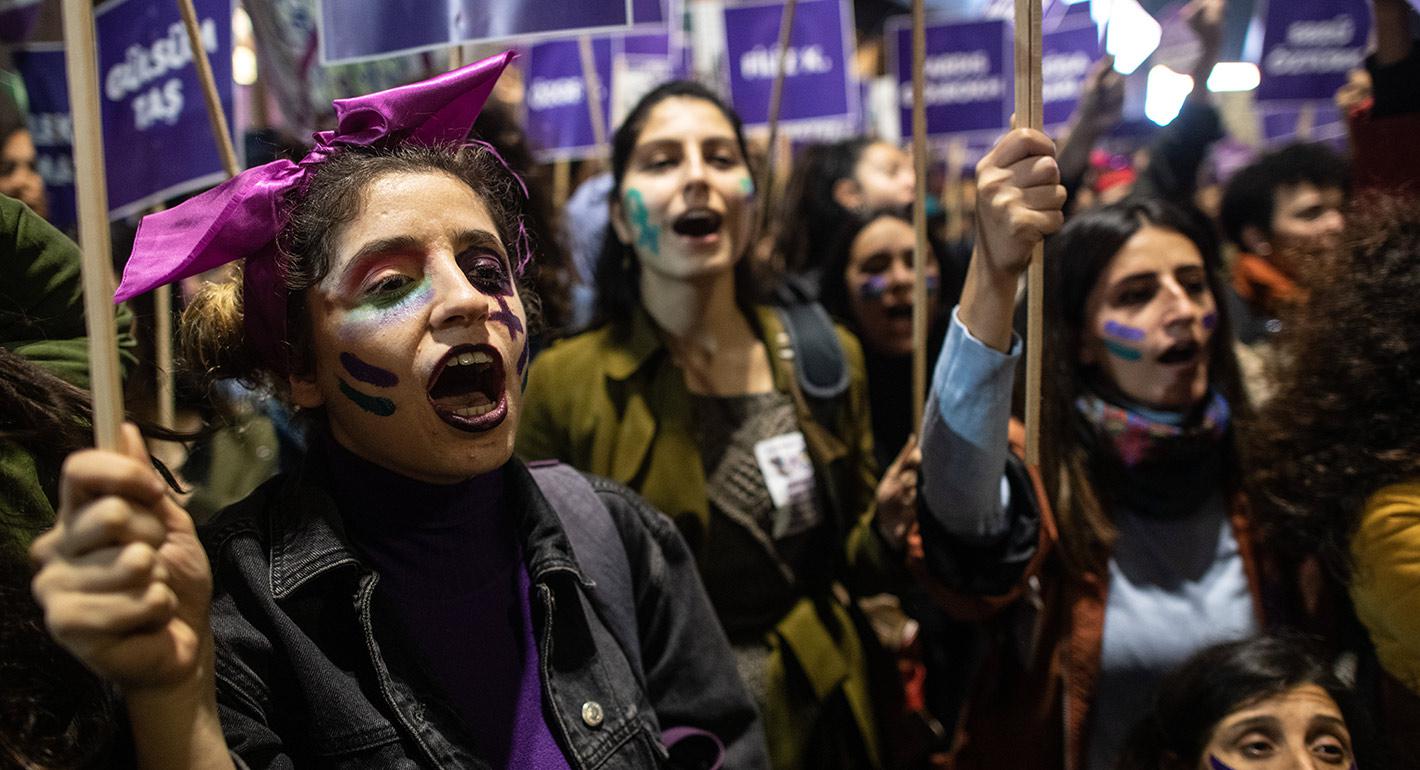Saskia Brechenmacher, Frances Z. Brown
{
"authors": [
"Saskia Brechenmacher"
],
"type": "commentary",
"centerAffiliationAll": "dc",
"centers": [
"Carnegie Endowment for International Peace"
],
"collections": [
"Gender"
],
"englishNewsletterAll": "",
"nonEnglishNewsletterAll": "",
"primaryCenter": "Carnegie Endowment for International Peace",
"programAffiliation": "DCG",
"programs": [
"Democracy, Conflict, and Governance"
],
"projects": [],
"regions": [],
"topics": [
"Political Reform",
"Democracy"
]
}
Source: Getty
Why Are Governments Weakening Protections Against Domestic Violence?
As nations ask people to stay home to stop the spread of COVID-19, reports of domestic violence have soared. Yet some European governments are trying to roll back rules designed to protect women.
The coronavirus pandemic has triggered spikes in domestic violence around the world, including in Europe. Organizations serving victims of abuse have reported dramatic upticks in the number of calls, emails, and website visits. Faced with movement restrictions and social distancing measures, many people affected by domestic violence are trapped at home with their abusers, struggling to access needed support networks and services.
Domestic Violence Protections Are Under Threat
In this context, it is particularly alarming that several European states have recently taken steps to leave the Council of Europe Convention on Preventing and Combating Violence Against Women and Domestic Violence, known in short as the Istanbul Convention. The Istanbul Convention, which came into force in August 2014, requires state parties to introduce laws that criminalize psychological and physical violence against women, implement preventative measures (such as public education campaigns, trainings for relevant professionals, and treatment programs for offenders), and regularly monitor progress.
In May 2020, the Hungarian legislature refused to ratify the convention, which the Hungarian government had previously signed in 2014. Last month, a narrowly re-elected Polish government announced that it is also considering withdrawing from the treaty and would submit the convention to the country’s Constitutional Tribunal for review. In Turkey, the ruling Justice and Development Party (AKP) has similarly threatened to leave the convention, arguing that Turkey had been wrong to endorse it in the past.
The timing of these moves is not coincidental. As the coronavirus pandemic has spread, all three governments have sought to mobilize their supporters along established cultural fault lines, perhaps to divert attention from the broader socioeconomic crisis—and to take advantage of the fact that pandemic-related restrictions have made it more difficult for their opponents to push back.
Governments Claim They Are Defending Family Values
Across all three countries, conservative ruling governments assert that they do not seek to erode protections against domestic violence: instead, they have attacked the convention for endangering traditional family structures and gender roles. The convention’s definition of the term “gender” as socially constructed roles, behaviors, activities, and attributes has emerged as a particular flashpoint, with critics (falsely) arguing that this framing undermines biological distinctions between women and men.
For example, the Hungarian government claimed that the treaty promotes “destructive gender ideologies.” The Polish justice minister called the treaty “an invention, a feminist creation aimed at justifying gay ideology,” while Turkish President Recep Tayyp Erdogan argued that the Convention was out of sync with “the values of Turkish society.” In denouncing the convention, these governments are following a regional pattern: Bulgaria’s Constitutional Court held it unconstitutional in 2018, citing the treaty’s definition of gender; Slovakia’s legislature rejected the ratification of the Convention in November 2019. Latvia’s Constitutional Court is currently examining the treaty’s compatibility with the country’s constitution.
How the “Anti-Gender” Movement Frames Its Argument
Growing pushback against the Istanbul Convention and its definition of gender is not an isolated phenomenon. Instead, it reflects the success of a broader transnational movement that has spread across Europe, Latin America, and other parts of the world over the past decade. Supporters of this movement see themselves in a global battle against what they describe as “genderism” or “gender ideology.” Although their campaigns take on different forms in different countries, they are defined by important similarities in rhetoric and tactics.
First, they use the term “gender ideology”—initially popularized by the Vatican—to group together a series of contentious social issues seen as threatening sex-based distinctions and traditional family structures, from abortion access and LGBTQ rights to sex education in schools, gender studies departments in universities, and gender mainstreaming policies in state bureaucracies. The inherent ambiguity of the gender ideology concept allows it to be easily adapted to different cultural and political contexts and policy debates. Second, anti-gender campaigns bring together a broad coalition of actors whose interests are otherwise not necessarily aligned, including Catholic and evangelical religious movements, mainstream conservatives, diverse civil society groups, and far-right populist parties. Third, they combine grassroots mobilization with strong transnational links and networks, such as the World Congress of Families. Lastly, these movements often invoke a new universalism, or “common sense,” presenting themselves as the defenders of an alternative societal and political consensus centered on the protection of the traditional family, the nation, and religious rights.
Some analysts have framed the growing success of these movements as a backlash against advances in gender equality gains and sexual minority rights—a kind of a moral panic unleashed by new threats to traditional gender roles. Yet this narrative fails to fully explain their political success. As different scholars have documented, contemporary anti-gender movements differ from earlier forms of resistance against LGBTQ and reproductive rights in that they make the terms “gender” or “gender ideology” a signifier for a much broader critique of liberal democracy, neoliberalism, and universal human rights frameworks. Critics of “gender ideology” not only seek to transform the wording of the Istanbul Convention to reflect a different definition of gender—they seek to transform the broader liberal democratic value system that gave rise to the treaty in the first place.
Vested with this more expansive meaning, “gender” becomes a potent vector for different forms of anti-establishment organizing, particularly in a context of heightened political, cultural, and economic insecurity. It creates new and at times counterintuitive alliances, for example between anti-LGBTQ groups and anti-Islamist populist movements in Europe. And it allows governments in polarized societies to rile up their support base along cultural fault lines while distracting attention from broader governance failures, including during the coronavirus pandemic.
Women Are Pushing Back
As anti-gender movements have grown in political importance, they are also encountering new forms of resistance. In Europe, right-wing governments’ attacks on the Istanbul Convention have not gone unopposed. Instead, women are pushing back, defying the coronavirus pandemic to voice their discontent.
In Poland, protesters took to the streets to rally against the government’s plans to withdraw from the Istanbul convention. Polish women have previously successfully pushed back against the ruling Law and Justice party’s efforts to further tighten the country’s already very tight abortion restrictions. These mass demonstrations forged new informal and formal ties between activists that have helped them to continue protesting. Yet ongoing pandemic-related restrictions are making it more difficult for women to push back against the government’s plans, forcing activists to get creative: during the lockdown period in the spring, women held up protest signs in lines in front of supermarkets to demonstrate against new women’s rights restrictions that were being discussed in parliament. In Hungary, which counts the lowest percentage of female lawmakers in Europe, female opposition MPs after the vote on the Istanbul Convention displayed posters featuring sexist comments by their male colleagues in protests.
In Turkey, Edogan’s announcement that he would consider withdrawing from the Istanbul Convention came as women across the country were already mobilizing in protest against the recent murder of twenty-seven-year-old university student Pinar Gultekin—the latest in a string of femicides that have doubled in the country since 2012. In early August, tens of thousands women went out in protest against Turkey’s potential retreat from the treaty, chanting “the choice is ours, the decision is ours, the night is ours, the streets are ours.” Turkish activists also launched a wildly successful global social media campaign to highlight violence against women in the country and demand greater government protections. Interestingly, rather than reinforcing existing political divides, Erdogan’s plans have angered women across the political spectrum, including those within his party—several of whom were instrumental in Turkey signing the Istanbul Convention in the first place. The government’s move may thus have the unintended effect of reuniting rather than further splintering Turkey’s women’s movement.
A Question of Life and Death
Across Europe, activists and protesters emphasize that debates over the Istanbul Convention are far from theoretical: instead, the failure of governments to fully implement the treaty continues to put women’s lives at risk. In Turkey, at least 474 women were murdered in 2019, many of them by partners, ex-partners, or male relatives. Women’s rights organizations note that existing protection measures are insufficient and ineffective. In Poland, politicians have repeatedly claimed that the country already offers more protections to women than the Istanbul Convention—sidestepping the fact that just last year, Polish lawmakers tried to narrow the country’s definition of domestic violence as only taking place when spouses had been beaten more than once. Likely due to a lack of faith in the country’s criminal justice system, Polish women continue to report fewer cases of domestic violence to the police than women in other EU countries. And in Hungary, Human Rights Watch has documented widespread government shortcomings in preventing and addressing domestic violence.
During the coronavirus pandemic, observers have raised fears of both democratic backsliding and regression with respect to gender equality gains. The ongoing debates around the Istanbul Convention show that these two trends are closely intertwined: mobilization against “gender ideology” needs to be understood within a broader context of democratic upheaval and crisis. Yet recent events in Turkey and Hungary also show that even as populist and authoritarian governments have weaponized the concept of gender to shore up their support, they are meeting new waves of feminist activism and citizen resistance.
About the Author

Senior Fellow, Democracy, Conflict, and Governance Program
Saskia Brechenmacher is a senior fellow in Carnegie’s Democracy, Conflict, and Governance Program, where her research focuses on democratic erosion, gender, and civic activism in the United States and globally. She also serves on the board of the International Center for Not-for-Profit Law.
- Africa’s Democratic Kaleidoscope: Trends to Watch in 2026Article
- Unpacking Trump’s National Security StrategyOther
- +18
James M. Acton, Saskia Brechenmacher, Cecily Brewer, …
Recent Work
Carnegie does not take institutional positions on public policy issues; the views represented herein are those of the author(s) and do not necessarily reflect the views of Carnegie, its staff, or its trustees.
More Work from Carnegie Endowment for International Peace
- The Kremlin Is Destroying Its Own System of Coerced VotingCommentary
The use of technology to mobilize Russians to vote—a system tied to the relative material well-being of the electorate, its high dependence on the state, and a far-reaching system of digital control—is breaking down.
Andrey Pertsev
- Indian Americans Still Lean Left. Just Not as Reliably.Commentary
New data from the 2026 Indian American Attitudes Survey show that Democratic support has not fully rebounded from 2020.
- +1
Sumitra Badrinathan, Devesh Kapur, Andy Robaina, …
- New Approaches to Defending Global Civil SocietyResearch
New thinking is needed on how global civil society can be protected. In an era of major-power rivalry, competitive geopolitics, and security primacy, civil society is in danger of getting squeezed – in some countries, almost entirely out of existence.
Richard Youngs, ed., Elene Panchulidze, ed.
- Notes From Kyiv: Is Ukraine Preparing for Elections?Commentary
As discussions about settlement and elections move from speculation to preparation, Kyiv will have to manage not only the battlefield, but also the terms of political transition. The thaw will not resolve underlying tensions; it will only expose them more clearly.
Balázs Jarábik
- The Trump Administration’s Tangled Talk About Democracy AbroadArticle
How significant are statements by senior U.S. officials about supporting democracy abroad in the context of a foreign policy led by a president focused on near-term transactional interests?
Thomas Carothers, McKenzie Carrier















